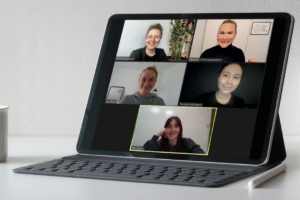written by Yasmin Kranewitter
In recent years, 56% of companies have implemented remote work strategies, leading to unexpected benefits like increased efficiency, improved work-life balance, and reduced costs (Zapia, 2022). Employees have welcomed the change, enjoying the lack of commute and greater flexibility. Remote work also creates a unique platform for promoting diversity, equity, and inclusion by providing safe spaces for underrepresented groups and opportunities to employ people globally. This blog post will discuss how remote work can boost workplace diversity and offer strategies to sustain an inclusive environment.
This blog article sums up the main points from a LinkedIn Live talk about how remote work can enhance workplace diversity with Anne Bibb (Founder & CEO of Remote Evolution™) and Barbara Covarrubias Venegas (Founder of #virtualspacehero).

Anne Bibb, Founder & CEO of Remote Evolution™, is a trailblazer in global human-centered growth, focusing on merger and acquisition, remote/hybrid work, employee experience (EX), and customer experience (CX) strategies. As a skilled strategist, she brings unique expertise to businesses navigating the digital landscape. With her name featured in Onalytica’s Who’s Who in Future of Work report, 2023 Top 50 Remote Innovators, and CX Network’s 2023 CX Influencers report, Anne is an influential figure in her field. She shares her insights through her role as a keynote speaker, host of the Unexpected Journey™ Podcast, and writing. Centered around the human experience, Anne and her team have facilitated the creation of thousands of jobs and expanding businesses across more than 30 countries. Connect with Anne on LinkedIn here.
❓ What Are The Benefits of Remote Work?
👉 By eliminating geographical limitations, companies implementing remote work can recruit talent globally. This not only broadens access to opportunities but also changes lives by offering employment in regions where such prospects may have been scarce. A diversity of thought, culture, race, religion, and other dimensions is also enhanced.
👉 Despite significant progress in recent decades, underrepresented groups often remain marginalized. Remote work provides a unique opportunity to ensure safety and protection for these minorities. In traditional office settings, individuals from these groups might worry about being different and face potential discrimination or unconscious biases. However, remote environments diminish these concerns and minimize visual biases. This enables employees to feel more comfortable and authentic, fostering a more inclusive culture. Companies benefit from diverse perspectives and experiences, which lead to improved performance and innovation. Embracing remote work helps organizations foster a culture that values diversity and creates psychological safety.
.
❓How Can You Promote Diversity And Inclusion?
Remote work significantly benefits diversity and inclusion within organizations when applied thoughtfully. However, sustaining diversity and inclusion requires continuous effort and dedication.
👉 Initially, recognizing that employees have diverse circumstances outside of work is crucial when promoting diversity and inclusion remotely. Organizations can support individual needs by offering flexible work models, allowing employees to tailor their schedules and work locations. This flexibility not only aids employees from diverse backgrounds, like caregivers or individuals with disabilities but also promotes a balanced work-life. By meeting individual needs, organizations nurture an inclusive culture where everyone can excel.
👉 Additionally, it’s important for organizations to actively listen to their employees. Establishing open communication channels, such as regular virtual check-ins or anonymous feedback tools, ensures every voice is heard. This method helps leaders understand unique employee challenges and integrate diverse perspectives, reinforcing an inclusive culture that values everyone’s contributions. By continually seeking and applying feedback, organizations can adapt their practices to serve a diverse workforce effectively.
👉 Lastly, promoting psychological safety is essential in a remote work environment. When employees feel safe, they are more likely to share their unique ideas and collaborate openly. To encourage this, organizations should create a supportive virtual workspace that promotes respectful communication and provides clear interaction guidelines. Cultivating an environment where everyone feels free to be themselves enhances the collective strength of a diverse workforce, leading to greater innovation, creativity, and overall performance.



❓ What Are the Challenges Posed by Remote Work?
While remote work brings numerous benefits, it also presents challenges that organizations and employees must navigate.
👉 While remote work provides numerous benefits, it also introduces challenges that both organizations and employees must manage. Remote work offers flexibility and autonomy, but can sometimes lead to feelings of isolation and loneliness, especially during crises like the COVID-19 pandemic. Abrupt changes to remote work can be difficult due to reduced social interactions. Organizations should support employees by providing resources like virtual team-building activities, wellness initiatives, and mental health support, ensuring regular check-ins and a supportive culture.n change in their work environment and the lack of social interactions. To ensure the employees’ well-being, organizations should prioritize providing support and resources. This can include virtual team-building activities, wellness initiatives, and mental health resources. Encouraging regular check-ins and fostering a culture of support and empathy ensure that employees feel connected, valued, and supported in their remote work environment.
👉 Moreover, diversity and inclusion efforts need to account for various preferences in collaboration and communication styles. While some employees excel with digital tools, others prefer face-to-face interactions and may find adapting challenging. Promoting inclusivity involves providing training for virtual tools and creating opportunities for in-person or hybrid interactions. Emphasizing flexibility and understanding is crucial in building an inclusive remote work culture that respects diverse employee preferences.
❓ How Can Leaders Actively Contribute to Enhancing Diversity in Remote Work?
👉 Adapting recruitment strategies: Organizations should prioritize diversity in recruitment, actively seeking candidates from underrepresented backgrounds and providing equal opportunities for growth and advancement.
👉 Active listening: Leaders need to foster open communication, regularly check in with team members, and be receptive to feedback to effectively understand and address their needs.
👉 Fostering inclusive collaboration: It’s important for leaders to set clear communication guidelines, encourage diverse perspectives, and use tools that promote equal participation and drive innovation.
👉 Diversity training: Leaders should commit to ongoing diversity and inclusion training to increase awareness, foster empathy, and navigate remote work challenges effectively.
❓How Can Employees Actively Contribute to Enhancing Diversity in Remote Work?
👉 Active listening remains essential, as employees enhance diversity in remote work by understanding and empathizing with colleagues’ experiences and perspectives, thus strengthening team relationships.
👉 Diversity and inclusion initiatives: Engaging in inclusion initiatives, attending diversity events, and promoting cultural exchange are crucial. These activities demonstrate a commitment to diversity, foster open dialogue, and help create an inclusive remote work environment.
👉 Promoting inclusive practices: Employees contribute to diversity by challenging biases, promoting equitable opportunities, and ensuring diverse perspectives are valued within their teams.
👉 Work-life balance: Lastly, it is essential for individuals to manage their time effectively and establish clear boundaries between work and private life to avoid burnout. Maintaining a healthy work-life balance is key to overall well-being and productivity.

In conclusion, remote work holds the potential to transform workplace diversity, equity, and inclusion. By adopting remote strategies, organizations can recruit globally, enhancing workforce diversity and reducing visual biases. Remote work’s advantages, like improved efficiency and greater flexibility, support a more inclusive environment. Nonetheless, challenges such as loneliness and the need for effective collaboration must be addressed carefully. Organizations should consistently focus on diversity and inclusion by maintaining open dialogue, promoting psychological safety, and adapting leadership strategies. This collaborative effort helps create a workplace that values each individual’s unique contributions, paving the way for a diverse and inclusive workforce. Remote work can redefine the future of work by eliminating barriers and fostering opportunities for all.




